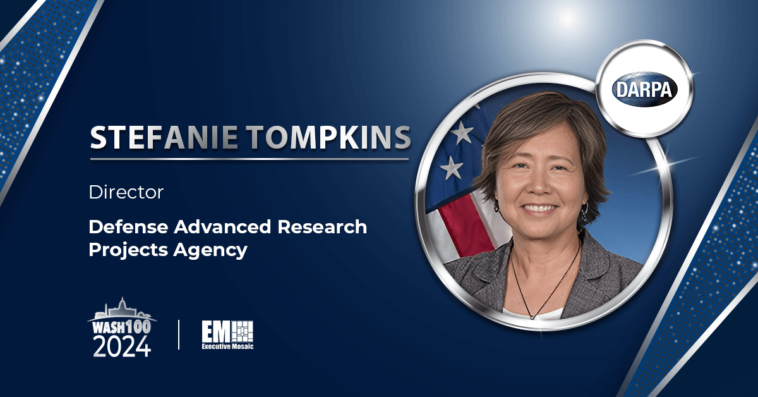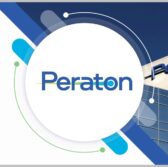Executive Mosaic is proud to confer upon Defense Advanced Research Projects Agency Director Dr. Stefanie Tompkins the Wash100 Award for 2024, her third win in total.
Click here to vote for Tompkins as one of your favorite GovCon leaders for 2024! The Popular Vote Competition of the Wash100 Award runs through April 30, 2024.
Executive Mosaic gives the prestigious Wash100 award every year to honor the most impactful and influential leaders in the GovCon industry. This year, Tompkins is being recognized for leading her agency in collaborating with various stakeholders to advance quantum computing technologies and develop trustworthy artificial intelligence in the service of U.S. national security.
“Stefanie’s leadership and deep expertise in science, technology, research and development is absolutely critical to our country’s ability to stay ahead of the technological curve in this era of heightened competition. From supply chain independence and innovation to cyber protection and AI development, Stefanie is spearheading impactful initiatives at DARPA and bolstering the vibrant U.S. R&D landscape,” said Jim Garrettson, CEO of Executive Mosaic and founder of the Wash100 Award. “We thank Stefanie for her bold leadership and promising vision for our future. Her embrace of advanced technologies has earned her a spot on our Wash100 list for the third year.”
Under Tompkins’ watch, DARPA launched the Quantum-Augmented Network program, which seeks to enhance the cybersecurity of classical networks — like the internet — with the help of quantum computing capabilities. The challenge that the program aims to overcome is the incompatibility between classical networks and quantum implementations stemming from a lack of cohesion in the latter. Success in combining the two would result in efficient security being brought to pervasive classical networks, thereby ensuring national security.
The agency also launched the Synthetic Quantum Nanostructures program, whose aim is to develop and demonstrate new manmade materials for superconducting electronic devices, which enable quantum computing. Currently, such devices have to be cooled to a fraction of a degree above absolute zero in order to accommodate quantum mechanical processes. The SynQuaNon program seeks materials that allow for a higher operating temperature, thereby reducing the size, weight and power requirements of cooling solutions.
DARPA also advanced the Underexplored Systems for Utility-Scale Quantum Computing program to its next phase. US2QC seeks to develop a quantum computer that can achieve utility-scale operation. Whereas the first phase sought design concepts, the next phase involves the creation of fault-tolerant prototypes. Technology companies Microsoft Corporation and PsiQuantum have been selected for the effort, which is expected to carry on until 2025.
Most notably, a breakthrough in quantum computing research has been achieved under DARPA’s Optimization with Noisy Intermediate-Scale Quantum devices program, which was launched in 2020 with the aim of demonstrating the advantage quantum information processing possesses over classical supercomputers. ONISQ involves the use of hybrid computing systems to solve an exceptionally difficult type of problem called combinatorial optimization. These hybrid systems feature a combination of classic systems and quantum processors, which make use of various types of quantum bits.
Researchers from Harvard University made the breakthrough when they were able to establish the first-ever quantum circuit using Rydberg logical quantum bits. The circuit created by the Harvard team involves 48 Rydberg qubits, the largest number in existence.
The discovery is seen to accelerate the development of fault-tolerant quantum computers.
Concerning AI, DARPA launched the AI Forward initiative last year, with the aim of soliciting the help of experts from the government, industry and academia to address the issue of AI trustworthiness. To achieve this, the initiative held a pair of workshops that sought to look into foundational theory about AI, engineering and human-AI teaming. The workshops, which were attended by about 200 participants in all, resulted in white papers that have helped inform funding for AI Explorations projects and may help with the development of other programs.
Trustworthiness is a critical element in a related DARPA effort called the Environment-driven Conceptual Learning program. ECOLE sought the help of teams from academia and industry to create artificial intelligence agents that are sufficiently competent to learn from linguistic and visual input and are capable of collaborating with humans to carry out information analysis for national security purposes.
Also connected to trustworthy AI is the Assured Neuro Symbolic Learning and Reasoning program. For ANSR, DARPA chose four teams comprising representatives of industry and academia to conduct research into the combination of data-driven machine learning with symbolic reasoning to achieve trustworthy AI. The program has three phases, the last of which will involve the demonstration of an autonomous system that will carry out a live intelligence, surveillance and reconnaissance mission.
Quantum technology and artificial intelligence are among the most consequential technological developments of the current era. If developed and utilized properly, they can help accelerate work and decision-making, and through computational power and machine learning, help achieve breakthroughs and discoveries that have hitherto been beyond reach. Furthermore, their implications in ensuring national security cannot be overstated.
For these reasons, the work of Tompkins in leading her agency to push the boundaries of quantum and AI is worthy of recognition as the kind of excellence that Wash100 celebrates.
Executive Mosaic congratulates Tompkins and her team at DARPA for another year of inclusion in the Wash100 roster and looks forward to her continued efforts in the year ahead.
Cast a vote now to select Tompkins as one of your favorite GovCon industry leaders for 2024!





